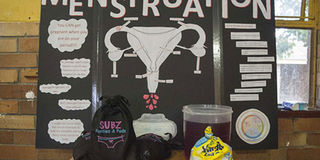Stop capitalist games around menses issues

Menstruation. A perfectly normal biological process gets distorted into shame and “dirtiness”. PHOTO | FILE | NATION MEDIA GROUP
What you need to know:
- We need to revisit how we deal with sexual and reproductive health education in schools.
- It is possible to change our approach on menstrual health via education and intentionally lessen the burden for women.
In my primary school, the menstruation process was taught to girls and not boys even though it was a biological topic in the syllabus.
Boys played in the field while girls crowded in a classroom with female teachers who spoke about menstruating in hushed tones.
During the lesson, a female reproductive organ was referred to as “that thing”, a typical reference for something we’re petrified or shamed of naming.
A lesson on how our “things” were going to betray us by bleeding unfolded in a way that left us wondering.
The shame of “womanhood” burdened with the responsibility of bodies we barely understood was laid on us.
As girls, the expectation to embrace complexities of bodies far greater than our minds could grasp was overwhelming.
A misguided thought that a girl’s body experiencing a biological process somehow made her a woman is as false as narratives can be.
BIGGER PICTURE
Anyway, the lesson ended with sanitary towels of different types and colours being given out — with a warning that they weren't to be seen by any male person.
It was like being initiated into a lifelong blood cult. A perfectly normal biological process gets distorted into shame and “dirtiness”.
When you have no idea and are least concerned about what happens to a human body during menstruation, how do you comprehensively talk about women’s health?
This disdain would cease to exist if we chose to approach menstruation as a health issue beyond the stereotypical “women’s issue”.
For example, the existence of substandard, harmful sanitary towels with plastic or synthetic lining in retail stores in emerging markets continues.
WASTE DISPOSAL
These towels are known for their intense irritation and also create environment for bacterial growth.
Plastic lined sanitary towels are the main reason why some women experience relentless allergies and yeast infections every menstrual cycle — not to mention the broader damage to the environment when it comes to waste disposal.
And there's more. Do the stakeholders in charge of the provision of sanitary products understand why reusable or washable sanitary towels given to poor school girls is inhumane however much it is meant to help?
Having to wash a used sanitary towel is unpleasant and not a choice anyone should be made to make.
It is distressful that this unsanitary choice of reusable towels is assumed to be an option.
HEALTH
A common justification is how good they are for the environment and better than nothing.
But no one talks about how much water they need to clean unless you use a washing machine — two things that poor households don't have.
And no one discusses how they easily stain. One could go on and on with examples of how badly we treat issues of menstruation.
So what is to be done? First, we need to revisit how we deal with sexual and reproductive health education in schools.
Burying our heads in the sand is clearly not it. Second, we must demand that the government fulfils its obligation on allocations on sanitary towels.
EDUCATION
As it stands, there was no mention of menstrual hygiene and/or sanitary towels in the 2018-2019 budget.
Third, we should ban plastic-lined pads and create a market for cotton breathable pads that don’t harm women.
It is possible to change our approach on menstrual health via education and intentionally lessen the burden for women. These capitalistic games being played around menstruation should end.





